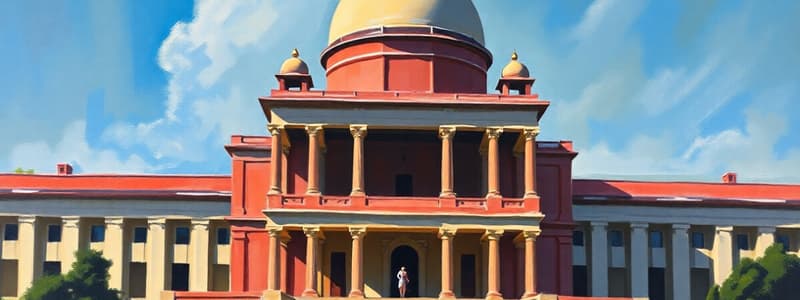Podcast
Questions and Answers
What is one of the main functions of the judiciary in India?
What is one of the main functions of the judiciary in India?
- Create new laws
- Develop economic policies
- Control executive actions
- Administer justice (correct)
Which of the following is NOT a level of the Indian judiciary?
Which of the following is NOT a level of the Indian judiciary?
- District Courts
- Local Councils (correct)
- Supreme Court
- High Courts
What is the minimum number of years an individual must be an advocate to qualify as a judge of the Supreme Court?
What is the minimum number of years an individual must be an advocate to qualify as a judge of the Supreme Court?
- 7 years
- 10 years (correct)
- 12 years
- 15 years
Who has the authority to remove a Supreme Court judge in India?
Who has the authority to remove a Supreme Court judge in India?
Which court is considered the apex court in the Indian judiciary system?
Which court is considered the apex court in the Indian judiciary system?
Flashcards
Supreme Court
Supreme Court
The highest court in India, located in New Delhi. It is the final arbiter of legal disputes and interprets the constitution.
Judiciary
Judiciary
The judicial body that interprets and enforces laws. They are independent of the legislature and executive.
Subordinate Courts
Subordinate Courts
Lower courts that handle specific types of legal matters within their respective jurisdictions.
Civil Courts
Civil Courts
Signup and view all the flashcards
Criminal Courts
Criminal Courts
Signup and view all the flashcards
Study Notes
The Indian Judiciary
- India has a federal system with two levels of government (central and state) and a unified court system.
- The judiciary is the third branch of the Indian government. It's independent of the legislative and executive branches.
- The judiciary's role includes administering justice, defining/interpreting laws, and protecting citizens' rights. It acts as the guardian of the Constitution.
Supreme Court
- The apex court is the Supreme Court of India, located in New Delhi.
- It holds the highest judicial authority.
- Judges of the Supreme Court are appointed by the President of India in consultation with the Council of Ministers.
- Qualifications for Supreme Court Judges:
- Must be citizens of India.
- Must be advocates of a High Court or two (or more) such courts in succession for 10 years or more.
- Must be judges of the High Courts for 5 years.
- Distinguished jurist according to the President's opinion.
- Supreme Court judges serve until they reach the age of 65. Removal from the Supreme Court is only possible for specific reasons and must follow a stated process.
High Courts
- High Courts exist in each state.
- They are subordinate to the Supreme Court.
- Additional subordinate courts exist below High Courts at the district level (ex: civil, criminal, revenue).
- High court judges hold office until the age of 65.
Studying That Suits You
Use AI to generate personalized quizzes and flashcards to suit your learning preferences.




